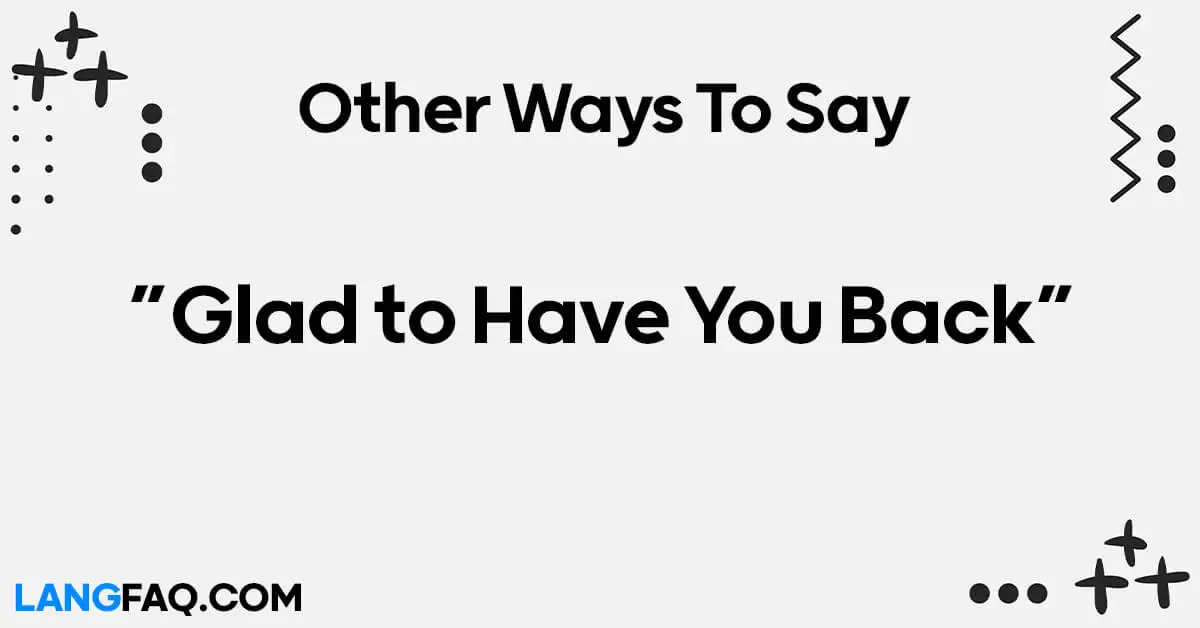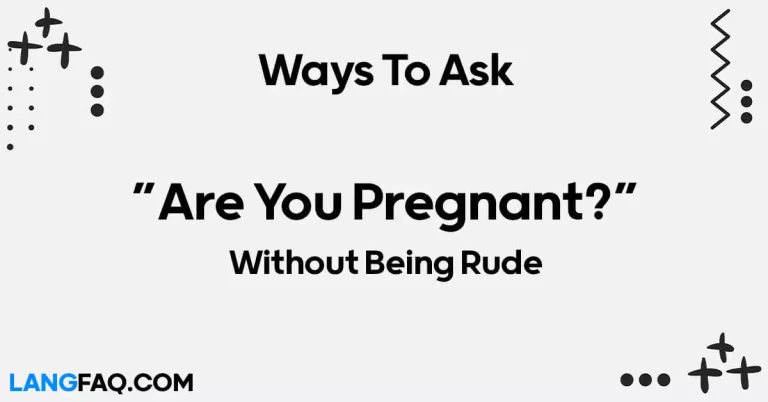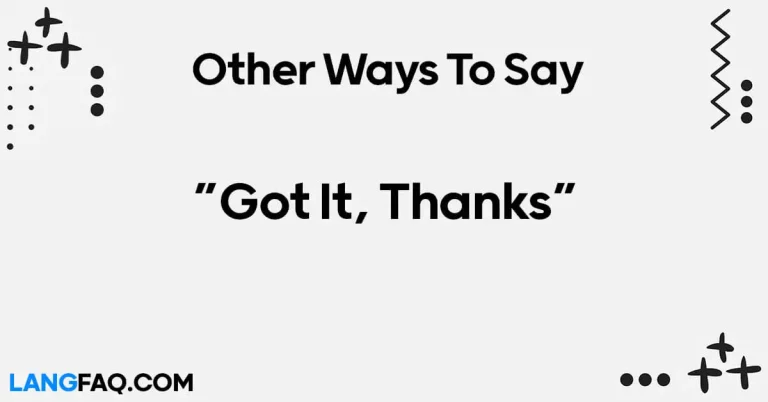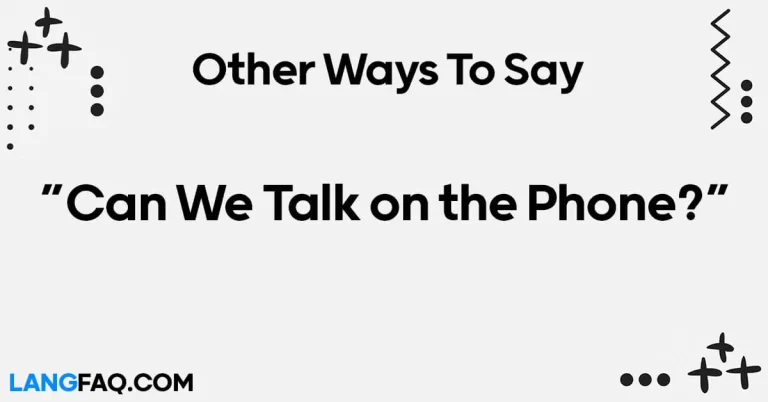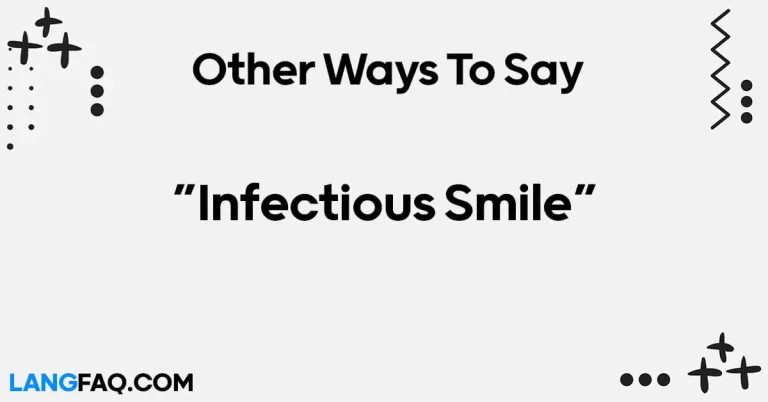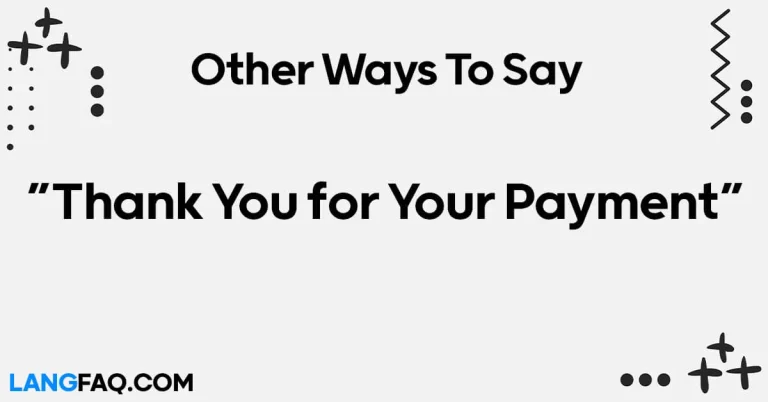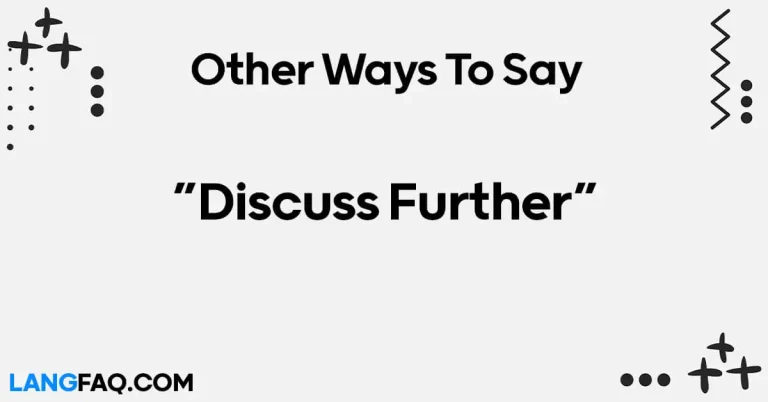Welcoming someone back is a joyous occasion, and using the same phrase repeatedly can become monotonous. In this article, we’ll explore 12 delightful alternatives to express your happiness when someone returns. From casual to formal, let’s dive into a world of diverse expressions that will make your welcomes more memorable.
12 Other Ways to Say “Glad to Have You Back”
Here are 12 other ways to say “Glad to Have You Back”:
- Happy to see you return!
- Delighted that you’re back.
- Thrilled to have you with us again.
- Overjoyed by your return.
- Elated to welcome you back.
- Ecstatic you’re back in the fold.
- Pleased to have you back in the circle.
- It’s wonderful to see you again!
- Excited to have you back on board.
- Rejoicing in your return.
- Grateful for your presence once more.
- Radiant to have you back with us.
Here’s a table with meanings and examples for the 12 ways to say “Glad to Have You Back”:
| Expression | Meaning | Example Sentence |
|---|---|---|
| Happy to see you return! | Expressing joy at the person’s comeback. | “I’m genuinely happy to see you return to our team.” |
| Delighted that you’re back. | Conveying sincere happiness and joy. | “We’re delighted that you’re back in the office.” |
| Thrilled to have you with us again. | Expressing excitement and enthusiasm. | “I’m thrilled to have you with us again this year.” |
| Overjoyed by your return. | Communicating intense happiness. | “We’re overjoyed by your return to the community.” |
| Elated to welcome you back. | Showing extreme happiness and delight. | “We’re elated to welcome you back to the family.” |
| Ecstatic you’re back in the fold. | Expressing overwhelming joy. | “I’m ecstatic you’re back in the fold of our group.” |
| Pleased to have you back in the circle. | Indicating satisfaction and joy. | “We’re pleased to have you back in the circle of friends.” |
| It’s wonderful to see you again! | Conveying admiration and joy. | “It’s wonderful to see you again after so long.” |
| Excited to have you back on board. | Displaying enthusiasm and anticipation. | “We’re excited to have you back on board the project.” |
| Rejoicing in your return. | Expressing joy and celebration. | “We’re rejoicing in your return to the team.” |
| Grateful for your presence once more. | Conveying appreciation and thankfulness. | “We’re grateful for your presence once more.” |
| Radiant to have you back with us. | Indicating joy and brightness. | “We’re radiant to have you back with us in the office.” |
These 12 expressions provide a vibrant palette of ways to convey joy and warmth when welcoming someone back. From the simple and heartfelt “Happy to see you return!” to the more formal and elegant “Pleased to have you back in the circle,” each phrase carries its unique charm.
By incorporating these alternatives, you can add a personal touch to your welcomes, making each return a memorable and uplifting experience. Whether in casual or formal settings, these expressions allow you to tailor your messages to the specific nature of the relationship or occasion, creating a more meaningful connection with those you welcome back.
Is It Correct to Say “Glad to Have You Back”?
Yes, “Glad to have you back” is a correct and commonly used expression to convey happiness and pleasure when someone returns after an absence. It is a warm and straightforward way to welcome someone back into a group, team, or community. This phrase is suitable for both casual and formal situations, making it versatile in various contexts.
When to Use “Glad to Have You Back”:
- Workplace Setting:
- Usage: Employed when a colleague returns to work after a vacation, leave, or any period of absence.
- Example: “Hey, John! Glad to have you back in the office. We missed your insights during the project discussions.”
- Social Gatherings:
- Usage: Appropriate for welcoming friends or family members back after a trip, event, or any time away.
- Example: “Welcome home! We’re so glad to have you back. The house wasn’t the same without you.”
- Formal Occasions:
- Usage: Suitable for more formal settings, expressing a polite and positive acknowledgment of someone’s return.
- Example: “We are truly glad to have you back at our annual conference. Your presence enhances the experience for everyone.”
Grammar and Usage Insights:
- Tense Usage: The phrase uses the present tense (“have”) to express current feelings of joy about the return.
- Formality: It strikes a balance between being warm and friendly, making it appropriate for both casual and formal situations.
- Versatility: The phrase can be used across various relationships, from colleagues and friends to family members.
Tips for Effective Use:
- Add Personal Touch: Consider adding a specific detail to personalize the welcome, showing that the return is genuinely appreciated.
- Combine with Other Phrases: While “Glad to have you back” is effective on its own, combining it with other expressions from the list can add variety to your welcomes.
Professional Main Example with “Glad to Have You Back”
Subject: Welcome Back to the Team!
Dear [Colleague’s Name],
I hope this message finds you well. On behalf of the entire team, I want to express how genuinely glad we are to have you back with us.
Your absence during your well-deserved break was felt, and your expertise was truly missed in our daily operations. Now that you’re back, we look forward to benefiting from your valuable insights and contributions once again.
Your role is integral to the success of our upcoming projects, and your return brings a sense of completeness to the team. We are confident that your dedication and skills will continue to elevate our collaborative efforts.
Please feel free to reach out if you need any assistance settling back in or catching up on recent developments. We are more than willing to support a smooth transition.
Once again, welcome back! We are truly glad to have you back on board.
Best regards,
[Your Full Name]
[Your Position]
[Company Name]
Happy to See You Return!
Welcoming someone with the phrase “Happy to see you return!” adds a genuine and straightforward touch to your expression. This phrase is versatile, suitable for both formal and informal settings.
When to Use:
- Formal Context: In a professional setting, this phrase can be used when a colleague returns to work after a leave or vacation.
- Informal Context: Among friends, use it when someone returns after an absence from a social gathering.
Example Sentence:
“We’re genuinely happy to see you return to our team. Your presence was missed during the project meetings, and we’re excited to have you back.”
Email Sample:
Subject: Welcome Back!
Dear [Colleague’s Name],
I hope this email finds you well. We’re happy to see you return to the team! Your insights and contributions were missed, and we’re looking forward to having you back in our upcoming projects. Welcome back!
Best regards,
[Your Name]
Delighted That You’re Back
Choosing the phrase “Delighted that you’re back” adds a layer of sincerity and warmth to your welcome. It’s a slightly more formal option suitable for professional and personal contexts.
When to Use:
- Formal Context: When a team member returns to the workplace, expressing delight adds a professional and warm tone.
- Informal Context: Use it when welcoming a friend back after an extended absence.
Example Sentence:
“We’re delighted that you’re back in the office. Your expertise and collaboration were missed, and we’re looking forward to achieving great things together.”
Email Sample:
Subject: Welcome Back to the Team!
Dear [Colleague’s Name],
We’re delighted that you’re back in the office! Your return brings a positive energy, and we’re excited to continue working together. Welcome back to the team!
Best regards,
[Your Name]
Thrilled to Have You with Us Again
Expressing excitement, the phrase “Thrilled to have you with us again” adds energy and enthusiasm to your welcome. It’s suitable for both formal and informal occasions.
When to Use:
- Formal Context: In a professional setting, use this phrase when a valuable team member returns.
- Informal Context: Among friends or family, convey your excitement when someone returns from a trip or event.
Example Sentence:
“I’m thrilled to have you with us again this year. Your expertise and dedication make a significant impact, and we’re excited about the projects ahead.”
Email Sample:
Subject: Exciting News – You’re Back!
Dear [Colleague’s Name],
I hope this email brings a smile to your face – we’re thrilled to have you with us again! Your presence is a true asset to our team, and we’re eager to embark on new projects together. Welcome back!
Best regards,
[Your Name]
Overjoyed by Your Return
Communicate intense happiness with the phrase “Overjoyed by your return.” This expression is suitable for conveying a deep sense of joy in various settings.
When to Use:
- Professional Context: Use it when a respected colleague returns, emphasizing the joy their return brings to the workplace.
- Personal Context: Among friends or family, express your overwhelming joy when someone returns after a long absence.
Example Sentence:
“We’re overjoyed by your return to the community. Your presence adds vibrancy and positivity, and we can’t wait to collaborate on upcoming initiatives.”
Email Sample:
Subject: Welcome Back – Overjoyed to Have You!
Dear [Colleague’s Name],
Our community is overjoyed by your return! Your contributions are invaluable, and we’re looking forward to achieving great things together. Welcome back!
Best regards,
[Your Name]
Elated to Welcome You Back
Expressing extreme happiness, the phrase “Elated to welcome you back” creates a warm and heartfelt welcome. This phrase suits various contexts, from professional to personal.
When to Use:
- Professional Context: Use it in a workplace setting to convey genuine joy when a team member returns.
- Personal Context: Among friends or family, express elation when someone returns after an absence.
Example Sentence:
“We’re elated to welcome you back to the family. Your insights and camaraderie were missed, and we’re eager to create more cherished memories together.”
Email Sample:
Subject: Exciting News – You’re Back!
Dear [Colleague’s Name],
We’re elated to welcome you back to the team! Your unique perspective and positive energy were missed, and we can’t wait to embark on new projects together. Welcome back!
Best regards,
[Your Name]
Ecstatic You’re Back in the Fold
Conveying overwhelming joy, the phrase “Ecstatic you’re back in the fold” emphasizes the sense of unity and togetherness. It’s a warm and inviting expression suitable for various settings.
When to Use:
- Workplace Context: Use it when a team member returns, emphasizing their integral role in the team.
- Personal Context: Among friends or a social group, express excitement when someone returns after an absence.
Example Sentence:
“I’m ecstatic you’re back in the fold of our group. Your presence enriches our interactions, and we’re looking forward to more shared experiences.”
Email Sample:
Subject: Our Team is Complete Again!
Dear [Colleague’s Name],
I’m writing to share the exciting news – we’re ecstatic you’re back in the fold of our team! Your unique contributions were missed, and we’re eager to continue our journey together. Welcome back!
Best regards,
[Your Name]
Pleased to Have You Back in the Circle
Choosing sophistication, the phrase “Pleased to have you back in the circle” adds a formal yet warm touch to your welcome. It’s suitable for professional and refined personal settings.
When to Use:
- Formal Context: In a professional setting, use it to welcome a team member back, especially in more formal environments.
- Refined Personal Context: Use it in social settings with acquaintances or in more formal relationships.
Example Sentence:
“We’re pleased to have you back in the office. Your professionalism and expertise were missed, and we’re eager to resume our collaborative efforts.”
Email Sample:
Subject: A Warm Welcome Back to the Team!
Dear [Colleague’s Name],
We’re pleased to have you back in the office! Your return adds a level of sophistication to our team, and we’re looking forward to achieving great things together. Welcome back!
Best regards,
[Your Name]
It’s Wonderful to See You Again!
Conveying admiration and joy, the phrase “It’s wonderful to see you again” is a versatile expression suitable for both professional and personal contexts.
When to Use:
- Professional Context: In a workplace setting, use it to express joy when a colleague returns, creating a positive and friendly atmosphere.
- Personal Context: Among friends or family, use it to convey delight when someone returns after an absence.
Example Sentence:
“It’s wonderful to see you again after so long. Your presence brings a sense of joy and familiarity, and we’re excited to catch up on everything.”
Email Sample:
Subject: Welcome Back – It’s Wonderful to Have You!
Dear [Colleague’s Name],
It’s wonderful to see you again! Your return brings positive energy to the team, and we’re eager to continue our collaborative journey. Welcome back!
Best regards,
[Your Name]
Excited to Have You Back on Board
Expressing enthusiasm, the phrase “Excited to have you back on board” signifies a positive anticipation for future collaborations. It’s suitable for both professional and personal settings.
When to Use:
- Professional Context: Use it in a workplace setting to convey excitement when a team member returns, creating an upbeat atmosphere.
- Personal Context: Among friends or family, express your enthusiasm when someone returns after an absence.
Example Sentence:
“We’re excited to have you back on board the project. Your unique skills and dedication were missed, and we’re looking forward to achieving milestones together.”
Email Sample:
Subject: Exciting News – You’re Back!
Dear [Colleague’s Name],
We’re excited to have you back on board! Your contributions make a significant impact, and we’re eager to embark on new projects together. Welcome back!
Best regards,
[Your Name]
Rejoicing in Your Return
Conveying joy and celebration, the phrase “Rejoicing in your return” adds a touch of festivity to your welcome. It’s suitable for expressing genuine happiness in various contexts.
When to Use:
- Professional Context: In a workplace setting, use it when a respected colleague returns, emphasizing the celebration of their return.
- Personal Context: Among friends or family, use it to convey the joyous atmosphere when someone returns after an absence.
Example Sentence:
“We’re rejoicing in your return to the team. Your presence adds a celebratory spirit, and we’re excited about the positive energy you bring.”
Email Sample:
Subject: Let the Celebration Begin – You’re Back!
Dear [Colleague’s Name],
We’re rejoicing in your return! Your contributions are invaluable, and we’re looking forward to celebrating many successes together. Welcome back!
Best regards,
[Your Name]
Grateful for Your Presence Once More
Conveying appreciation and thankfulness, the phrase “Grateful for your presence once more” adds a layer of sincerity to your welcome. It’s suitable for expressing gratitude in various settings.
When to Use:
- Professional Context: In a workplace setting, use it to convey gratitude when a team member returns, emphasizing the value they bring.
- Personal Context: Among friends or family, use it to express heartfelt gratitude when someone returns after an absence.
Example Sentence:
“We’re grateful for your presence once more in our team. Your contributions are appreciated, and we’re excited about the positive impact you make.”
Email Sample:
Subject: Grateful for Your Return – Welcome Back!
Dear [Colleague’s Name],
We’re grateful for your presence once more! Your return adds tremendous value to our team, and we’re looking forward to achieving great things together. Welcome back!
Best regards,
[Your Name]
Radiant to Have You Back with Us
Infusing positivity, the phrase “Radiant to have you back with us” associates the return with brightness and positivity. It’s suitable for creating an uplifting welcome in various contexts.
When to Use:
- Professional Context: Use it in a workplace setting to convey positivity when a team member returns, creating a vibrant atmosphere.
- Personal Context: Among friends or family, use it to express the joyous and radiant atmosphere when someone returns after an absence.
Example Sentence:
“We’re radiant to have you back with us in the office. Your presence brightens our workspace, and we’re looking forward to achieving success together.”
Email Sample:
Subject: Radiant News – You’re Back with Us!
Dear [Colleague’s Name],
We’re radiant to have you back with us! Your positive energy uplifts the team, and we’re eager to continue our collaborative journey. Welcome back!
Best regards,
[Your Name]
Frequently Asked Questions
What makes a welcome memorable? Creating a memorable welcome involves sincerity, enthusiasm, and personalization. Use phrases that resonate with the nature of your relationship.
Are these expressions suitable for formal occasions? Yes, several expressions, such as “It’s a Pleasure to Have You Back,” work well in formal settings. Choose phrases that align with the tone of the occasion.
Can I use these alternatives in written communication? Absolutely! These expressions are versatile and can be used in verbal or written welcomes, making them suitable for cards, emails, or messages.
How do I choose the right expression? Consider the nature of your relationship and the setting. Formal occasions may warrant more refined expressions, while casual reunions allow for a more relaxed approach.
Why is it essential to vary welcome expressions? Using diverse expressions prevents monotony and adds a personal touch to your welcomes, making the recipient feel truly valued.
Do these phrases work for welcoming colleagues at the workplace? Certainly! While maintaining professionalism, phrases like “Thrilled You’re Back” or “Delighted to Have You Return” convey warmth in a workplace context.
Conclusion
In the art of welcoming, the words we choose carry immense significance. By embracing various expressions, we not only avoid the trap of repetition but also deepen the emotional impact of our welcomes. Whether casual or formal, let these alternatives infuse your reunions with genuine joy.

